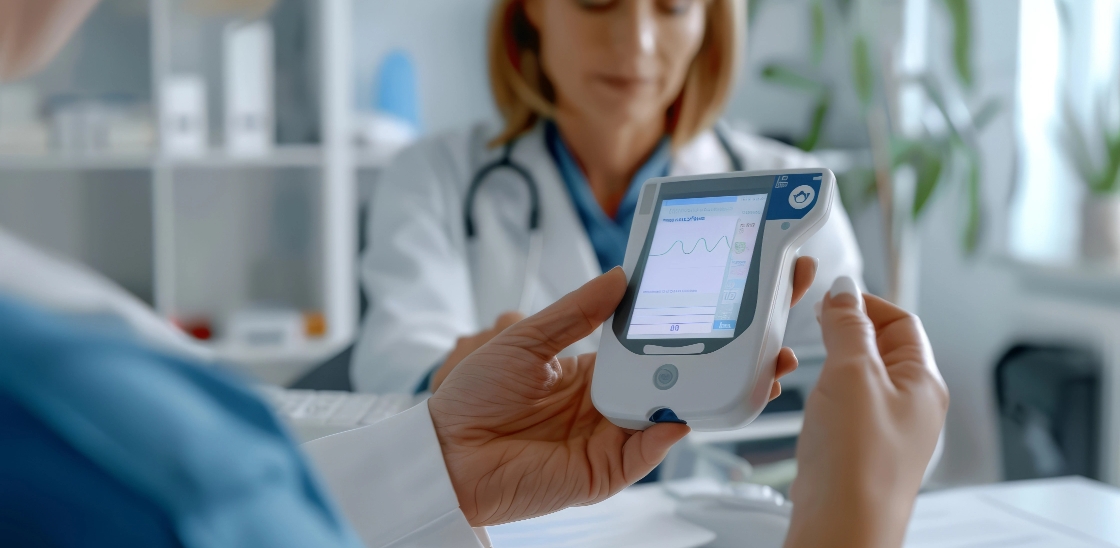3 data and analytics trends shaping the MedTech industry
Reading Time: 4 minutes

In the MedTech industry, one of the key challenges lies in balancing cutting-edge advancements with the practical realities of cost, regulation, and swiftly changing consumer preferences. A recent survey of 800 U.S. patients between the ages of 13 and 72 found that 94% leverage devices and apps to manage their health conditions¹. This statistic underscores a growing market demand that MedTech companies cannot afford to ignore.
As the landscape continues to evolve, data and analytics have become indispensable tools for MedTech companies striving to stay ahead. In this blog, we’ll explore 3 key data and analytics driven MedTech trends that are shaping the MedTech industry and driving innovation, efficiency, and patient engagement
1. Generative AI’s impact on personalization and governance in MedTech
MedTech is no exception to the transformative power of Generative AI. With its capabilities in predictive analytics and automated reporting and documentation, generative AI offers unprecedented opportunities for personalization and governance in medical technology.
Nearly 90% of the value from the use of artificial intelligence in life sciences may be derived from three functional areas: commercial ops, research and development (R&D), and manufacturing and supply chain.²
– (Deloitte)
Generative AI is revolutionizing how MedTech healthcare solutions’ providers tailor their messaging and marketing efforts to their customers. By analyzing vast amounts of patient and consumer data, AI can identify patterns and preferences. This allows healthcare organizations to deliver targeted messaging that resonates with individual customers. In terms of governance, generative AI enhances data accuracy and ensures compliance with regulatory standards. It can automate the documentation and reporting processes required for regulatory compliance, making it easier for healthcare providers to adhere to stringent industry standards while maintaining the integrity of their marketing campaigns.
2. Adopting cloud-based analytics to drive innovation and efficiency for MedTech devices
Cloud-based analytics is transforming the MedTech industry by providing scalable, cost-effective solutions for data management and analysis. By leveraging the cloud, MedTech companies can access powerful analytics tools that drive innovation and efficiency.
Cloud-based analytics allows for real-time monitoring of MedTech devices, enabling early detection of problems and proactive maintenance. There are cloud-native solutions that can enhance medical device technology by predicting potential failures before they occur, minimizing disruptions and extending the lifespan of devices. It can also seamlessly integrate data from various sources, such as patient records, medical devices, and clinical trials. This comprehensive view allows for a deeper understanding of how devices are impacting patient outcomes. It also supports product development by delivering deep insights from aggregated data, helping companies innovate and improve their offerings based on actual usage and performance data.
Companies need to modernize their legacy data systems through state-of-the-art data engineering to fully leverage these capabilities. This process involves extracting meaningful intelligence from Master Data, Enterprise Resource Planning (ERP) systems, and building decentralized data architectures. These modern architectures maximize business consumption and throughput while minimizing the cost of building and governing data.
3. Harnessing real-world data for medical technology breakthroughs
Real-world data (RWD) is emerging as a critical component in the development of innovative medical technologies and treatments. By leveraging data from real-world settings, MedTech companies can gain insights that drive medical technology innovation and improve patient outcomes.
It can be used to assess the effectiveness of MedTech devices and treatments in real-world settings, complementing traditional clinical trials. It also provides valuable insights into patient behavior and outcomes, helping to identify areas for improvement and innovation. Efficient management of RWD accelerates the development and approval of new medical technologies, bringing innovations to market faster. RWD also provides a more comprehensive understanding of patient outcomes, enabling continuous improvement in medical devices and treatments.
Conclusion
Generative AI, cloud-based patient data analytics, and real-world data are driving significant advancements in the MedTech industry. By embracing these trends, business leaders can enhance innovation, improve patient outcomes, and achieve greater operational efficiency. The future of MedTech lies in the intelligent use of data and analytics, and those who lead the way will reap the rewards.
1. https://www.accenture.com/content/Accenture-Reinventing-MedTech-With-Intelligent-Technologies.pdf
Featured blogs
Subscribe to get latest insights
Talk to our experts
Get the best ROI with Sigmoid’s services in data engineering and AI
Featured blogs
Talk to our experts
Get the best ROI with Sigmoid’s services in data engineering and AI






